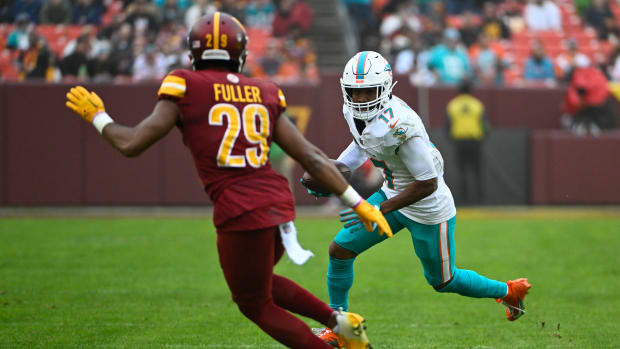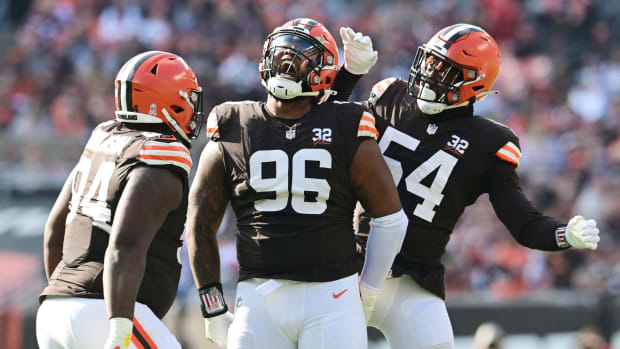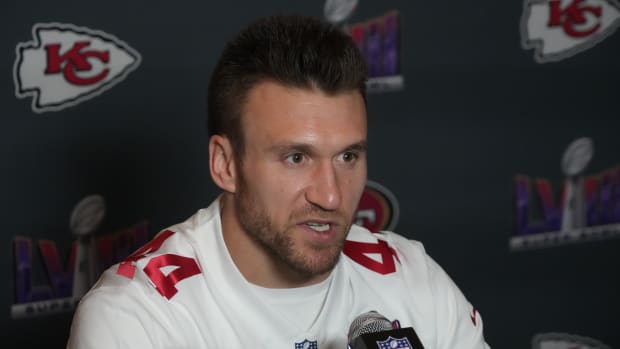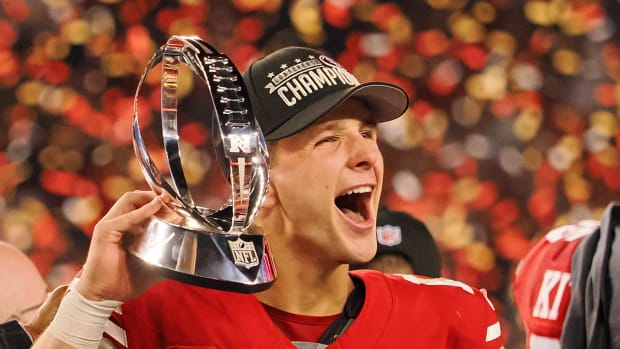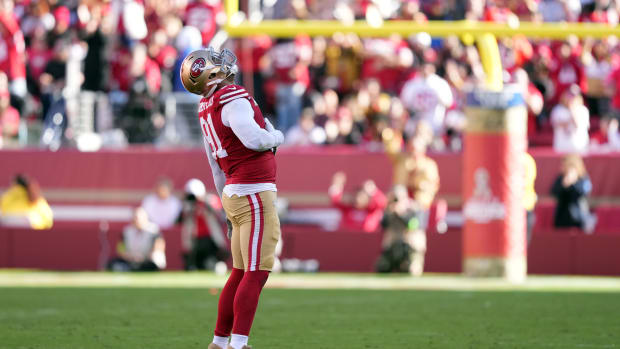Kyle Shanahan: "How the heck are there only four black head coaches out of 32?"
49ers head coach Kyle Shanahan spoke for a half hour about racism in the United States Wednesday on a video conference.
He spoke on a wide range of topics from racial issues in society to racial issues in the NFL. And yes, he believes there are racial issues in the NFL.
Here is the transcript of Shanahan's comments about race from the video conference. I don't want to get in the way of his powerful, touching words, so I present them on their own.
Q: Have you discussed the current racial issues happening in the country with your players?
SHANAHAN: "We all started talking about it on Monday, and it really has continued to today. Not one day has gone by where we haven't discussed it. On Monday, we're in zoom meetings with different position groups. Monday, I talked to all the skill guys about it and the offensive line. Then the next day, I hit up the defensive line and the defensive backs. And then, yesterday, John and I got on a call with about 12 guys, just some of the veterans, just to continue to talk about it.
"It has been great for us to all talk about. We have an impressive group of guys, and they have been very impressive throughout this whole situation. It's been very open and it has been good to hear all of them."
Q: Why is it important for you to talk during this time, and what has struck you in your conversations with your team about how they're feeling collectively as a group?
SHANAHAN: "People are hurting. Black people mainly are scared. And the disturbing thing is they've been scared for a long time. This is it -- this is their cry for help they've been giving for a long time, and people don't totally listen. I think everyone is at fault for that, but I'm not saying black people are, because they're the ones who have been screaming, and I think everyone is at fault for not totally listening. And I think one thing that bothers me the most throughout this all and my life experiences is racism is a big deal in our country right now. That's a fact. That's not debatable. It always has been a big deal. It is today just like it was 100 years ago.
"I think something as a white person that bothers me is I don't think all white people realize that. There are different parts of this country where if white people don't see it, they don't think it's happening. They associate racism with slavery and stuff from a long time ago. And there are certain parts where if they don't see it, they don't think it's happening, and that's the problem. Racism is all over, and it's what black people deal with every day. White people are very sheltered to that an ignorant. I think that is the message that has been missed.
"I've been in sports my whole life. I've had white friends, black friends, Asian friends -- all types of friends. I've been fortunate to be in situations where I was in communities or teams where it wasn't a big deal -- the same stuff I see with my kids. I'll keep my kids in those situations so it's never a big deal for them. And it wasn't for me. But there was stuff when I got older with my black friends that I promise you is consistent with...all black friends, where ever I had them. I moved everywhere in my life. Never lived anywhere longer than four years. So I've been all over this country and had all types of friends.
One thing I can tell you is consistent: Some of my black friends, some of the toughest guys I've been around, awesome dudes who I've never seen get scared of anything, and I can't tell you how many times I'm with one of my black friends and we're around a cop, and I can feel something different with those guys. They're scared, and it's something that has always bothered me. And I've been in some situations worse than others. But regardless, I don't know how they feel, but I can feel that they feel different than me. That's a fact. Doesn't matter if it's a black guy in California or Atlanta. It's something they all feel.
"I don't know Champ Bailey very well. I know my dad does. I know John Lynch does. When he gave his Hall of Fame speech last year about this stuff, I could hear the passion in Champ's voice and the fear he had for his kids and how real it was. That's the same stuff I've seen with my friends since I was 17 and we got caught sneaking out. The difference between the black kid who was scared and me, who wasn't because I thought I had rights. That's a white privilege that not everyone realizes.
"People need to know just because you don't see it, it doesn't mean it's not there. And white people have to acknowledge that this is a fact, it's not debatable and there's nothing more apparent than what happens numbers-wise to black people and what's going on with the police force. The numbers say it. Also, the life experiences of all black people say it. And that's something that isn't debatable. That's a fact. It has gone on way too long. I think now people are listening more than I've ever heard before, which is good. And that's a starting point, because it has happened too long. It's very clear. I don't want to debate it anymore. No one does. Open your eyes."
Q: Have you and your players had discussions about ways you and your players can take action and use your platform during the season?
SHANAHAN: "Yeah, we have had lots of discussions and thrown a ton of stuff out. There are so many different ways to go. It's such a deep thing. You're not going to see change tomorrow. It has to be every day and it has to happen through generations. We have danced around it for too many generations.
"What's apparent when you talk to our players -- we always talk about the generations, and how all our grandparents, white grandparents, black grandparents, they usually don't understand it as much as our parents do. And our parents don't understand it as much as we do. And then you look at some of the 22-year-old rookies, and that's a generation that's different than some of our 32-year-old veterans.
"And then I look at my kids, and they don't see it at all. And that's the stuff that we have to keep doing. And how do you do that? You have to vote. You have to change all that stuff, which takes time. How can you educate people on that? How can you make a difference? That's something our players are looking into.
"Everyone wants to put money in the right spot, but you don't just want to throw you money somewhere, because people have thrown a lot of money at this stuff over the last 20 years, and I don't think anyone sees a ton on progress. Not enough. Not until this doesn't ever happen. So we talk about all that stuff. What I hear the most for the players is what we can do for the youth, and setting examples. If all kids could watch how our players interact with each other, that's how all people should interact with each other.
"But when some people grow up in an all-white neighborhood, or some people grow up in an all-black neighborhood, and the first time they hang out with the other side is in college. And now they're both trying to deal with all this stuff that they've dealt with because they haven't hung around anyone in their life and they're uncomfortable. And it just goes longer. In our locker room, that's why I feel very fortunate that I've been around these situations, because in a football locker room, since I was born, you're around everybody. It makes it a lot easier. It doesn't leave.
"I know I'm rambling, but that's because there are so many ways you can help. Our guys all will do things in different ways. We'd like to do something collectively as a team, and that's something we're still discussing. But the main thing is how do you do it now, how do you do it a week from now, how do you do it everyday of your life? Everyone has to do that individually. People have to be aware, admit what's wrong, they have to talk and we have to break through whatever the awkwardness that is between races, because that's not there with everybody, but it's there with way too many people.
"I know our players are so passionate -- black guys and white guys -- about trying to fix this. But we all know it's not an easy answer. It's the whole country admitting what is wrong, which isn't debatable. So people need to come out from being sheltered or ignorant. Kids need to help their parents. Parents need to help their parents. We all need to speak about it and do stuff.
"We're going to do a lot. It's not specific yet, but I know our guys are working hard at it."
Q: Some of this discussion was being held throughout the NFL after Charlottesville in 2017. Do you feel, after talking with your players, that this is different, just from the tenor of the conversations, the passion you're hearing?
SHANAHAN: "Yeah, it gets stronger and stronger. When there's a big deal going on that is fundamentally wrong for a human being, people aren't born with racism -- they're not. And when there's something going on that has happened for a long time that is wrong, and the whole community recognizes it, and the other part of the community doesn't, that has to be brought to attention.
"I do think that came up hard in 2016. It comes up hard every couple years this stuff happens. The problem is it happens again. I say for myself, if I'm screaming for something that's wrong and it keeps happening, you're going to do to whatever you have to do to get people to hear you when it's that messed up. And so, each time, hell yeah it gets worse because black people are fed up.
"I know I'm fed up with seeing this. How do we stop it? Yeah, it takes a really bad person to do something like this. The problem is percentage-wise, there's a little too many bad people. A community has to fix that -- not one thing. That's the collective consciousness. The only way to do that is hanging together. That's what I think is cool with kids and sports. That's what is cool in colleges. There is no big deal at all. But when you spend your whole life not around a certain culture, that's not good and it should never be that way, and it has been that way too long in this country, and there are lots of reasons for that that I'm not educated on, whether it's laws, voting -- whatever it is.
"People who know a lot more than that, what they're screaming for is people to listen, because they're trying to educate them. All you have to do is watch a documentary here and there, listen to someone here and there. Almost every black person I've ever met has been complaining about this since I've hung with black guys -- almost my whole life. Also, what I feel from them when I'm around them and we're around cops, or we're in a situation at a party and for some reason the white people aren't that cool -- they feel that their whole life. I've gone to a black party and felt that before. Like, man, maybe people don't want me here. It felt like crap. What if I felt that way my whole life every time a cop looked at me? Whether the cop is racist or not, that's how they feel, because too many have been like that. It's a fact. People have to know. Just because you don't see it, doesn't mean it's not happening.
Q: Drew Brees has been in the news the last couple days for what he said, and Vic Fangio said he hasn't seen racism in the NFL, which he apologized for. From a league perspective, how do you think the league is doing in terms of having African American coaches and people in power?
SHANAHAN: "I think they're trying to address it. They're talking about it. I saw what Vic said and I saw him apologize for it. It's tough because white people don't feel it. You're not going to think that person is racist. But you know what? How the heck are there only four black head coaches out of 32?" And only two GMs? The majority of our players are black, so the fact that there are that few, that's not debatable. I don't know if people are openly thinking they're doing it, but that's what the problem is. That number is not debatable. And that is an issue. We talk about it a lot and it is something that has to get better.
"I only speak for myself, but I try to hire people that I work with that are prepared for it. Fortunately, that has worked out well for me. We have a Muslim coordinator, a black coordinator, we have a lesbian on our staff -- we have everything. It's not just to show people we're trying to be diverse. It's just because I have been around these people and they're really good at what they do and we can't win without these people. And that's just how it works out. I don't know why the numbers are like that, but it's wrong. And it's something that hell yeah we want to fix, but it's not an easy answer. The whole thing with society, everything, it's all very similar on different levels. That's why those numbers. Don't lie. That's what makes it a fact. And that's what white people have to admit."
Q: As a parent, how are you talking to your kids about what's going on in the country?
SHANAHAN: "I kind of go both ways with it. We don't watch a lot of news here, and we're in quarantine. We don't have these news channels on all day. My kids aren't on social media. So they're not freaking out about it, because they're not aware of a ton of it.
"They have seen it. I talked to them about that I'm going on here with you guys to talk, so I've been talking to them about it the past hour. One thing that's tough with my kids is, I think it's so cool watching a human being when they can have a black friend over and a white friend, and they don't know that they had a black friend over and a white friend. They don't know. It's not in their consciousness. It hasn't been taught to them that there's an issue. They have no clue.
"And I see that so genuinely in all three of my kids, and I saw it right away when they were two, three, four. But now they're 12, 10 and 7 and it hasn't changed. I don't want a situation like this, when they're innocent, and I love how they see life and people, I don't want to get on the news and show them all this stuff, and them be like, 'Oh my God, do black people not like me?'
"And that's not it. My kids are as comfortable as can be. And I don't want to change that for them. And I think most youth is like that. And that's where I worry so much that we're better than our parents and our parents better than our grandparents, but the stuff right now, I'm worrying about our kids. Our kids are already better. Look at the Millenials -- they're so much better than even we were. I don't want to mess up the younger generation right now because they're good. We just can't mess them up. And every generation before us has messed up the younger ones.
"We can get better, but our kids are already good. I like that they're not asking me a bunch of questions about this. They'll know about this. They'll learn about it. We just talked for an hour on it. But I like where they're at. I want to keep that hopefully for the rest of their lives."
Q: Do you have players who want to openly protest during the season, as Colin Kaepernick did in the past? Would you support them?
SHANAHAN: "The same way we always have, but probably with more passion. I mean, we understand it more and more. But I think our organization supported that as well as anyone. I think we've done a great job with that. I think our team has represented that very well. I think people understand it so much more now than they did three years ago.
"I'm all for protest. I'm all for change. I hope the protests cause change. Whatever we have to do to get the change, I'm for it. I know our organization is. I know Jed (York) is. I know our players are. We always have been. What's different now from then, it's embarrassing to say but I think white people are more passionate about it now than then. That's our ignorance and what upsets black people.
They have every right to be upset, because they haven't just been telling us this the past few weeks. They have been telling us this since our grandparents. I've been hearing it from every one of my friends since I was 14. Then I hear Champ Bailey talking about it in his Hall of Fame speech. It's all the time. And it's too long. So whatever has to get changed, let's do it."
Q: A couple days ago, Stephen Jackson said he felt the NFL owed Colin Kaepernick an apology. Do you agree, and what would an apology for Kaepernick look like?
SHANAHAN: "I think the biggest thing that's so hard with the Colin thing is people misunderstanding what he was doing. I think that's why the reactions have been hard the last couple days over things that people are still confused. Regardless of whether you agree with how he did it -- that doesn't matter. What Colin was protesting was something that should be respected by all humans. That did take a lot of courage. It is something that is 1,000-percent wrong in what he was trying to fix and bring light to.
"Gosh, it was hard to bring light to the whole country, because people didn't want to totally hear it. And it got diluted with so many different stuff. What helped me was being in San Francisco. I wasn't here with Colin, but I was here with a lot of his teammates who were here with him and guys who did that with him and continued to do it when Colin was gone, that helped John and I a lot because there was no debate. These were the guys who started it, and it was very clear when they articulated it why they were doing it.
"And so, the whole debate on all the other stuff, the flag, everything -- people don't want to hear that. What he was doing was a big deal. Whether you disagree with how he did it doesn't matter. It's three years later, and there are still some people not understanding what his message was. Too many people aren't understanding the message that everyone has been giving for a long time. And Colin did it the strongest out of anyone. And people should respect him a ton for that and admire that."
